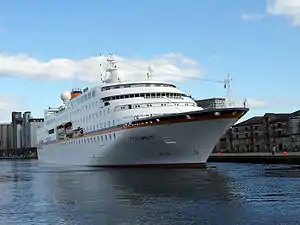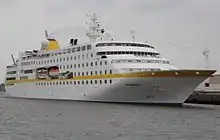 C Columbus visiting Cork Harbour | |
| History | |
|---|---|
| Name |
|
| Owner | Conti Holding GmbH & Co KG, Munich |
| Operator |
|
| Port of registry | 1996 onwards: Nassau, |
| Builder | MTW Schiffswerft GmbH, Wismar, Germany[1] |
| Yard number | 451[1] |
| Laid down | 5 September 1995[1] |
| Launched | 30 October 1996[1] |
| Completed | 17 June 1997[1] |
| In service | 1997– |
| Identification |
|
| Status | In service[2] |
| General characteristics [1] | |
| Type | Cruise ship |
| Tonnage | |
| Length | 144.13 m (472 ft 10 in) |
| Beam | 21.50 m (70 ft 6 in) |
| Draft | 5.15 m (16 ft 11 in) |
| Depth | 13.25 m (43 ft 6 in) |
| Decks | 6 |
| Ice class | GL E2 |
| Installed power | 4 × Wärtsilä 6L32 (4 × 2,640 kW) |
| Propulsion | Two controllable pitch propellers |
| Speed | 16 knots (30 km/h; 18 mph) |
| Crew | 170 |
MS Hamburg is a 15,000-ton, 420 passenger, luxury cruise ship owned by the Conti Group and is now operated by Plantours Kreuzfahrten. She was built in 1997, in Wismar, Germany. Her relative small size allows her to transit the Great Lakes in North America, where she cruised seasonally between 1997 and 2011 and again in 2022, as well as other cruises worldwide as travelling the Mediterranean for cultural cruises with Martin Randall Travel, the north Atlantic and at Asia. Her crew consists of 170 members,[3] and her top speed is 16 knots.[4] She was previously known as Columbus for Hapag-Lloyd, she was since replaced by Columbus 2.[5]
Incidents

In April 2015, the vessel suffered damage due to an oil leak. The following trips were canceled in Tanger.[6]
On 5 May 2015, a fishing net became tangled in the ship's propeller off the South East coast of England. The ship was diverted to Southampton to be inspected.
On 11 May 2015, the ship grounded on charted rocks near the New Rocks buoy in the Sound of Mull, Scotland. The official accident report states that Hamburg's bridge team failed to apply Bridge Team Management tools effectively.[7]
The ship needed to be repaired at a shipyard in Belfast and at Bremerhaven and would be completed by 10 August 2015. To continue operations, Plantours chartered MS Deutschland.[8][9]
On November 26, 2021, the MS Hamburg arrived in the Port of Buenos Aires coming from Cape Verde. The port was operating under a new, more restrictive, protocol for ships arriving from Africa, due to the emergence of the SARS-CoV-2 Omicron variant. However, according to Argentine newspaper Clarín, the Argentine authorities thought Cape Verde was in Asia and not in Africa, and let the ship enter the port without applying the correct protocol. According to the same report, the authorities took 12 hours to realize their mistake. The Argentine authorities, however, denied the mistake, stating that all the passengers in the ship were tested for Covid and that the results returned negative.[10]
References
- 1 2 3 4 5 6 7 8 "Hamburg (93233)". DNV Vessel Register. Germanischer Lloyd. Retrieved 15 November 2012.
- 1 2 "Hamburg (9138329)". Equasis. French Ministry for Transport. Retrieved 15 November 2012.
- ↑ "MS Columbus Review". Euro Lloyd. Archived from the original on 9 February 2009. Retrieved 25 February 2009.
- ↑ "MS Columbus Ship details" (PDF). Hapag-Lloyd. Archived (PDF) from the original on 19 February 2009. Retrieved 25 February 2009.
- ↑ "Make It A Double, EUROPA!". Maritime Matters. Archived from the original on 10 April 2011. Retrieved 7 April 2011.
- ↑ "MS Hamburg had Motor problems: Current Trip cancelled". 27 April 2015. Archived from the original on 28 May 2015. Retrieved 28 May 2015.
- ↑ "Grounding of passenger cruise ship Hamburg". GOV.UK. Archived from the original on 16 June 2016. Retrieved 17 June 2016.
- ↑ "MS Deutschland in Service for PLANTOURS Kreuzfahrten" (PDF). May 2015. Archived from the original (PDF) on 29 April 2021. Retrieved 31 May 2015.
- ↑ "MS Deutschland goes successful at extension" (PDF). Plantours Kreuzfahrten. 9 July 2015. Archived (PDF) from the original on 10 July 2015. Retrieved 10 July 2015.
- ↑ "Alerta por Ómicron: hubo un caso de Covid en un barco que llegó de África e investigan de qué variante se trata". Clarín (in Spanish). 29 November 2021. Archived from the original on 29 November 2021. Retrieved 30 November 2021.
External links